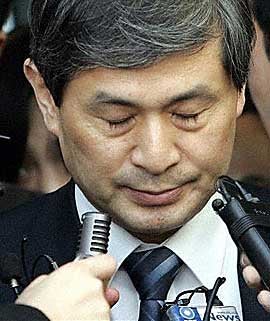The troubled scientist behind the world's first human cloning experiments has resigned from a South Korean university after the school announced that he fabricated results in stem-cell research.
The results raised hopes of new cures for hard-to-treat diseases.
A university panel, releasing initial findings of a probe, accused researcher Hwang Woo-suk of damaging the scientific community with his deception, while South Korea's government it may pull its funding for research by the country's star scientist.
"I sincerely apologize to the people for creating a shock and disappointment," Hwang told reporters as he was leaving his office at Seoul National University, considered the country's top institution of higher learning.
"With an apologetic heart ... I step down as professor," he said.
However, Hwang still maintained that he had produced the technology to create patient-matched stem cells as he claimed to do in a May article in the journal Science.
"I emphasize that patient-specific stem cells belong to South Korea and you are going to see this," said Hwang, a veterinarian.
A panel of Seoul National University experts said Hwang had faked results of at least nine of 11 stem cell lines he claimed to have created in the May paper — the first confirmation of allegations that have cast a shadow over all his purported breakthroughs in cloning and stem-cell technology.
"This kind of error is a grave act that damages the foundation of science," the panel said.
The South Korean government, which had strongly supported Hwang and designated him the country's first "top scientist," said Friday it was "miserable" over the reported results of the investigation and will start its own probe over ethics breaches.
Choi Seong-sik, vice minister of science and technology, said it's impossible to recover money already spent for Hwang, a total 40.5 billion won (US$39.9 million, ¤33.75 million) for research and facilities since 1998. But his ministry, which admitted errors in its handling of Hwang's projects, will look at ending other funding and withdraw the "top scientist" designation.
Still, the government said it would support other similar research.
The university panel said today that it found that "the laboratory data for 11 stem cell lines that were reported in the 2005 paper were all data made using two stem cell lines in total."
To create fake DNA results purporting to show a match, Hwang's team split cells from one patient into two test tubes for the analysis — rather than actually match cloned cells to a patient's original cells, the university said.
"Based on these facts, the data in the 2005 Science paper cannot be some error from a simple mistake, but can only be seen as a deliberate fabrication to make it look like 11 stem-cell lines using results from just two," the panel said.
"There is no way but that Professor Hwang has been involved," the university's dean of research affairs, Roe Jung-hye told a news conference, adding that Hwang "somewhat admits to this."
The panel said DNA tests expected to be completed within a few days would confirm if the remaining two stem-cell lines it had found were actually successfully cloned from a patient. The earlier claims of patient-matched stem cells were seen by scientists worldwide as a key step to creating tailored therapies for hard-to-treat diseases, such as paralysis or diabetes.
In light of the revelations, the panel said it would now also investigate Hwang's other landmark papers — which include another Science article in 2004 on the world's first cloned human embryos, and an August 2005 paper in the journal Nature on the first-ever cloned dog. The journals already are reviewing all the work.
Professor Alan Trounson, a top stem-cell researcher at Australia's Monash University, said the scandal showed scientists were rigorously checking one another's results. But he predicted the fallout would also stain any other scientists linked to Hwang's work, also saying that the South Korean's claim to have cloned a dog was "very much in doubt now."
"I think a lot of the community were very impressed with the cloning of a dog — and it was a delightful dog — but I actually don't think it is a cloned dog now," Trounson told The Associated Press in a telephone interview.
Hwang has already asked Science to withdraw the May paper, citing "fatal errors," claiming he had created only some of the 11 stem-cell colonies at the time of publication but completed the work later.
The university panel said today that it found no records of two of the other stem-cell lines Hwang claims to have created. Four others died from contamination, and another three were in the nurturing stage and hadn't yet become full stem-cell lines.
Hwang's article this year had also been viewed as significant for his efficiency in cloning the stem-cell lines, claiming to use just 185 human eggs to create custom-made embryonic stem cells for the 11 patients.
But Roe said the investigation had "found that there have been a lot more eggs used than were reported" and were investigating the exact number.
Prosecutors said they would decide whether to investigate Hwang after the university finishes its probe. The Seoul District Prosecutor's Office said Hwang's fabrication itself is not subject to criminal charges, but indicated an investigation could be possible as upset citizens had filed complaints.
Hwang had last month resigned as head of the World Stem Cell Hub — an international project founded in October that had planned to open centers in Britain and the United States — after admitting he used eggs from female workers at his lab in violation of ethics guidelines. Sung Sang-cheol, head of Seoul National University Hospital where the hub is located, said Friday the center would continue working but might be reorganized or renamed.
Subscribe to Independent Premium to bookmark this article
Want to bookmark your favourite articles and stories to read or reference later? Start your Independent Premium subscription today.


Join our commenting forum
Join thought-provoking conversations, follow other Independent readers and see their replies